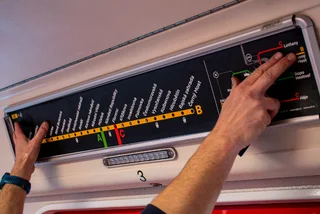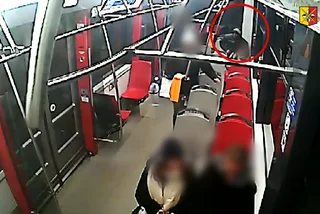This is a weekly overview of the latest coronavirus news for Prague and the Czech Republic. Here you'll find important developments, organized by date, and updated daily by Expats.cz as well as a live data stream taken from the Ministry of Health. A regularly updated list of restrictions can be found here.
For a more detailed breakdown of Covid hospitalization, vaccination, and mortality data for the Czech Republic, see CovData.cz.
March 13
Overview Czech Republic sees lowest Saturday rise in cases in nine weeks
The Czech Republic reported another 4,422 new Covid cases on Saturday, 139 fewer than a week ago, according to the latest data from the Czech Health Ministry. The number of new cases represents the lowest Saturday rise over the past nine weeks in the Czech Republic.
The number of suspected reinfections fell by 70, to 755 cases. On the other hand, the number of tests performed fell by about twenty percent. For the first time since January 25, the number of people hospitalized with Covid-19 fell under 2,000.
There are now 500 new Covid cases per 100,000 people over the past seven days in the Czech Republic, 14 fewer cases than on last Saturday. The highest incidence rate is currently in the Plzeň and Vysočina regions, with the lowest rate in the Karlovy Vary and Liberec regions.
March 12
Overview Rise in new Covid-19 cases remains steady
The Czech Republic reported 8,365 new Covid-19 cases on Friday, a week-on-week increase of 110 cases, according to the latest data published by the Czech Health Ministry. Rates of testing and hospitalizations both continue to steadily decline.
Over the past week, the number of new cases rose in a week-on-week comparison each day except Tuesday, but only by a small percentage. The Czech Republic's reproduction number, indicating how many people one Covid positive person infects, is hovering at around 1.0, currently 0.99.
Over the past seven days, the country has reported 501 new cases per 100,000 people. The highest incidence rate is currently in the Plzeň Region, with 665 cases per 100,000 people over the past week. The situation is now the best in the Karlovy Vary Region, with an incidence rate of 337 cases per 100,000 people.
March 11
OVERVIEW New Covid cases up again week on week
There were 8,238 new Covid cases, up from 8,075 a week ago. Suspected reinfection was seen in 1,545 cases, which was 12 fewer than last week. The number of people hospitalized continues to decline. There are 2,173 Covid patients with 129 in serious condition. A week ago there were 2,613 patients and 190 serious cases. A preliminary nine deaths were reported. The seven-day toll is 203 and the toll for March is 389.
In the past day, 3,950 people were vaccinated including 2,931 booster shots. Some 698 people completed vaccination. A total of 905 people have had the Nuvaxovid vaccine from Novavax since it was introduced at the start of the year. At the beginning of the year, 100,000 people were vaccinated daily, in February the daily number of administered doses was in the lower tens of thousands, and in March only in the thousands.
The reproduction number R is at 0.97, close to the break-even point. The incidence number of new cases per 100,000 people over the past seven days is at 500, up from 499 a day earlier. The highest incidence number is in the Plzeň region at 662 and the lowest is in the Karlovy Vary region at 367. The incidence number for Prague is 545.
EMA recommends Moderna vaccine for children
The European Medicines Agency (EMA) has recommended Spikevax from Moderna for vaccinating children aged 6 to 11 against Covid. It should be half the strength of the adult dose, and booster shots will be possible. The vaccine is already approved for use in adults and children aged 12 and above. In the Czech Republic, children from the age of five are vaccinated with the previously approved Comirnaty childhood vaccine from Pfizer/BioNTech.
March 10
OVERVIEW Experts predict start of a new but smaller Covid wave
Some 9,034 new Covid cases were detected on Wednesday, compared to 8,966 a week earlier, and 1,700 people had repeat infections. According to experts, the current development may signal the onset of a new, smaller wave of Covid due to the more contagious BA.2 subvariant of the Omicron.
The number of hospitalized patients continues to decline week on week. There are 2,228 Covid patients in hospitals, with 142 serious cases. Last week there were 2,750 patients and 197 serious cases. A preliminary 14 deaths were reported. The seven-day toll is 216, and the toll for March is 298.
Only 3,987 vaccination doses were administered, including 3,078 booster shots. Some 550 people completed vaccination. A total of 727 have received the protein-based Nuvaxovid vaccine from Novavax, which was introduced earlier this month.
The reproduction number R is rising again and is at 0.95. The number of new cases per 100,000 people over seven days is at 499, up from 498 a day earlier. The incidence number in Prague is 545. It is highest in the Plzeň region at 670 and lowest in the Karlovy Vary region at 357.
Respirators only required on public transit as of March 14
The wearing of respirators against the spread of Covid spread will remain mandatory in only public transport, and health and social services as of March 14, Health Minister Vlastimil Válek tweeted. No protection of the respiratory tract will be compulsory anywhere else. "If the positive development continues, we will fully abandon the respirators during April," he added.
Currently, respirators are required in all public internal spaces including workplaces and public transport. Wearing a respirator will still be required in public transport, such as trains, buses, taxis, and chairlift cabins. They will also be compulsory in the homes for the elderly, the disabled, and those with dementia. Exemptions remain for pre-school children, persons with diminished intellect and mental capabilities, hospitalized people, public transport drivers, and those with a medical certificate saying their health condition prevents it.
March 9
OVERVIEW Total Covid deaths exceed 39,000
There were 10,484 new Covid cases on Tuesday, compared to 11,626 a week ago. It is another week-on-week decline except for a mild increase on Monday. The number of suspected reinfections also dropped on Tuesday, by 240 to 1,975 compared to the previous Tuesday.
The country's Covid death toll has exceeded 39,000 since the epidemic outburst in March 2020, reaching 39,032. A preliminary 17 deaths were reported for Tuesday. The seven-day toll is 225 and the toll for March is 262.
The number of Covid hospitalizations continued falling week on week on Tuesday, when it was 2,269 with 153 were in serious condition, compared to 2,995 patients and 213 serious cases a week ago. One month ago, there were still about 4,000 people with COVID-19 in hospital, including 250 in serious condition.
Some 3,104 people got vaccinated on Tuesday, including 2,332 booster doses and 496 completing vaccination. A week ago, 3,921 people were vaccinated.
The reproduction number R is at 0.94. The incidence number of new cases per 100,000 people over seven days is at 498, down from 509 a day earlier. It is the lowest figure since Jan. 12. A week ago, the incidence rate was 570. Out of the country's 14 regions, the incidence remains the highest, 651, in the Plzeň region, and the lowest, 354, in the neighboring Karlovy Vary region. In Prague, it is 547.
Minor wave could be starting
Experts say Czechia faces another, a minor wave of the coronavirus epidemic. According to data from the Institute of Health Information and Statistics (ÚZIS), the increase is not linked to the inflow of refugees from the war-stricken Ukraine. According to the National Health Institute (SZÚ), a newly detected subvariant of the Omicron coronavirus variant, the more infectious BA.2, has spread from Denmark. Sample sequencing data show that BA.2 makes up about one-quarter of new infections in Czechia.
Biologist Jaroslav Flegr said that a small spring wave might be expected and it had already started in Prague. However, he dismissed that it would have something to do with the arrival of Ukrainian refugees. Instead, he said the relaxation of the anti-epidemic measures came roughly one month earlier than it should have. He expects another wave to come in the autumn, but its impact will gradually weaken thanks to the vaccination and the available medicine, he added.
March 8
OVERVIEW Infections and hospitalizations starting to rise again
On Monday, there were 10,387 newly confirmed Covid cases, compared to 10,145 a week earlier. Laboratories found 1,984 suspected recurring infections yesterday, which is 117 more than last Monday.
The number of people with coronavirus in hospitals continues to decline week-on-week but has been rising for two days. There are 161 more than in the weekend. There are now 2,285 patients including 153 serious cases. Last week saw 23,288 patents with 234 serious cases. A preliminary 11 deaths were reported. The seven-day toll and toll for March is is 219. Medics administered 3,326 vaccine doses including 2,547 booster shots. Some 495 people completed vaccination.
The reproduction number R is 0,93. It is still under 1.0, meaning the pandemic is receding, but the number has been rising. The incidence number, which has been steadily declining in previous days, is 509 today, three more than the previous day. One week ago, there were 595 new cases per 100,000 people in seven days. The Plzeň region is highest, at 655, up from 633 a day earlier. The Karlovy Vary region is lowest, at 346, down from 372 a day earlier. The incidence number for Prague is at 561, down from 571 a day earlier.
ANO and SPD take pandemic law to Constitutional Court
The Constitutional Court received a proposal from the opposition ANO and Freedom and Direct Democracy (SPD) movements to repeal part of the Pandemic Law. Judge-rapporteur Jaromír Jirsa will prepare a draft ruling, which he will submit to all of the constitutional judges for a vote. ANO and SPD are asking for priority consideration of the proposal.
March 7
OVERVIEW Czechia sees lowest number of new Covid cases since Jan. 2
Tests confirmed 2,572 new Covid cases on Sunday, the lowest number since Jan. 2. A week earlier there were 3,326 new cases. Laboratories found out 461 suspected reinfections on Sunday, some 20 fewer than a week ago.
The number of people hospitalized with Covid dropped to 2,095 with 163 serious cases, compared to 2,897 patients and 323 serious cases a week ago. A preliminary 13 deaths were reported for Sunday. The seven-day toll is 230 and the toll for March is 175. Only 189 vaccine doses were administered, inculcating 167 booster shots. Som 14 people finished vaccination.
The incidence number of new cases per 100,000 people over the past seven days is 506, the lowest since Jan. 12. Yesterday it was 513 and a week ago it was 625. In Prague, the incidence number is 571.
March 4, 2022
OVERVIEW Serious Covid cases fall to lowest level since October
Tests on Thursday confirmed 8,081 new coronavirus cases, compared to 10,026 a week earlier. The daily increase is the lowest since Jan. 10. Suspected reinfections were at 1,562, a week earlier there were 1841. The number of people hospitalized with Covid is at 2,419, the lowest since Jan. 30, and there are 167 serious cases, the lowest since Oct. 25. A week ago there were 2,276 covid patients with 246 serious cases. A preliminary 14 deaths were reported. The seven-day toll is 260, and the toll for March is 87.
Interest in vaccinations is declining. Just 4,656 were vaccinated on Thursday, including 3,517 booster doses. Some 864 people completed vaccination. A week ago paramedics distributed almost 8,100 doses. Almost 6.85 million people in the Czech Republic have been vaccinated, and more than four million have received a booster dose.
The incidence number of new cases per 100,000 people over the past seven days is at 531, the lowest since mid-January. On Wednesday it was 549, one week ago it was 702. The highest incidence remains in the Plzeň region, at 681. The lowest is in the Karlovy Vary region at 384. Prague is at 590.
Germany deletes all countries from its high-risk list
Germany deleted all countries, including the Czech Republic, from its list of areas with a high risk of coronavirus infection. Those who were not vaccinated or did not have Covid in the past six months no longer need to quarantine after entering the country. The Czech Republic had been on Germany’s list since mid-November. Under the new rules, Czechs no longer have to fill in the passenger locator form when entering Germany.
Travelers entering Germany must still present a certificate showing Covid vaccination or recovery, or a negative PCR test. Children under 12 are exempt. Previously, the exemption was granted to only children under 6. Germany will now only define as high-risk those countries where coronavirus variants other than Omicron, which caused a mild course of the infection, predominate.
Only five people received Novavax vaccine on first day
The new Nuvaxovid vaccine from the pharmaceutical firm Novavax was given on Wednesday to the first five people, all in Prague. According to Tuesday’s data, there are about 8,500 candidates and about 130,000 doses available. Some 41 vaccination sites have this type of vaccine, at least one in each region. Seven are Prague. The numbers infected with coronavirus have been declining for several weeks, as has the interest in vaccinations, especially the first vaccination.
ANO and SPD to contest Pandemic Law in Constitutional Court
The opposition movements ANO and Freedom and Direct Democracy (SPD) plan to jointly submit a proposal to the Constitutional Court by the end of the week to repeal part of the pandemic law. They are asking for priority discussion. They criticize the discussion of the amendment in a state of legislative emergency.
March 3, 2022
OVERVIEW Fewest new Covid cases since Jan. 10
There were 8,939 new Covid cases reported for Wednesday, down from 11,209 a week earlier. It is the lowest number of new cases on a workday since Jan. 10. There were 1,671 suspected reinfections, which is also down from 2,010 a week earlier. Some 2,689 people are hospitalized with Covid, the lowest since Jan. 30, and 197 are in serious condition, also the lowest since the end of January. Last week there were 3,424 hospitalized with 246 serious cases. A preliminary 16 deaths were reported. The seven-day toll is 271. The toll for March is 49.
Vaccinations continue to decline. There were 4,698 vaccine doses administered, including 3,529 booster shots. Some 871 people completed their initial vaccination. A week ago, medics delivered 7,378 doses of the vaccine, of which 5,443 were booster shots.
The reproduction number R is at 0.83. The number of new cases per 100,000 people over the last seven days fell to 549 from 570 a day earlier. The pandemic is worst in the Plzeň region, at 697 and the lowest is in the Karlovy Vary region at 407. Prague is at 608.
Seven Prague locations offer Novavax vaccine
People can get vaccinated with the Nuvaxovid vaccine from the pharmaceutical firm Novavax at 41 places in the Czech Republic. Most of them are in Prague, South Moravia, and the Ústí nad Labem region. In total, it is possible to be vaccinated against coronavirus with other vaccines at 460 sites. In Prague, people can get the vaccine at Motol University Hospital (FN Motol), Military University Hospital Prague (ÚVN), Prague Congress Center, Avenier - centrum očkování a cestovní medicíny, GHC Genetics ImunoGen, and LRS Chvaly.
Vaccination with Nuvaxovid has already started, but the Health Ministry's data does not show how many people have received it so far. About 8,500 candidates have pre-registered for this vaccine in the last month. So far, 130,000 doses have arrived and 370,000 have been ordered. The vaccine is based on a protein spike. The Health Ministry hopes it will appeal to people who are wary of mRNA-based vaccines.
March 2, 2022
OVERVIEW All pandemic indicators dropping
Tests on Tuesday confirmed 11,631 cases of coronavirus, compared to 14.209 a week earlier. The number of people hospitalized with Covid decreased to 2,864, with 202 serious cases, compared to 3,615 patients and 242 serious cases, Hygienists also recorded 2,214 suspected recurrent infections, a tenth lower than a week earlier. A preliminary 14 deaths were reported. The seven-day toll is 269.
As the epidemic slows, interest in vaccinations is declining. On Tuesday, 3,627 people came for the Covid vaccine, a week earlier it was more than double. Of those vaccinated on Tuesday, 2,724 had booster shots and 711 completed vaccination. Some 6.85 million people in the Czech Republic have been vaccinated, and more than four million of them have received a booster dose.
The reproduction number is 0.81. The number of new cases per 100,000 people over seven days is 570, down from 595 a day earlier. The incidence continues to decline and is the lowest since mid-January. One week ago it was 754. The highest incidence is in the Plzeň region at 730, while the lowest is in the Karlovy Vary region at 407. Prague is at 627.
SZÚ recommends sequencing of Ukrainian refugees' Covid samples
The Czech National Health Institute (SZÚ) recommends sending samples of Covid-positive Ukrainian refugees for sequencing analysis as a precautionary principle. The laboratory looks into the spread of the coronavirus variants. According to the data from before the Russian invasion last week, Ukraine was facing a coronavirus epidemic wave starting in mid-January that culminated in early February when the seven-day Covid incidence was roughly 860 cases per 100,000 inhabitants, while in the Czech Republic, it was four times higher then. About 36 percent of the inhabitants of Ukraine are fully vaccinated against Covid compared to roughly 65 in the Czech Republic.
War in Ukraine could cause resurgence of Covid
The humanitarian crisis caused by war in Ukraine may cause Covid to spread further. It will also hamper vaccination efforts across Europe, health security and human rights specialists said, according to a report by Bloomberg. A large number of refugees would significantly affect the ability of neighboring countries to provide health care, including Covid-19 shots. “There are not yet good systems for providing vaccines in humanitarian and conflict situations. The influx of large populations living in crowded conditions will result in increased transmission but little protection.” Northeastern University law professor Brook Baker told Bloomberg.
Omicron makes up 99 percent of Covid cases
Currently, the Omicron variant prevails in the Czech Republic, making up 99 percent of positive cases, while some 16.7 percent of them are its sub-variant BA.2. Omicron started prevailing over Delta around Jan. 9 and now, it is responsible for almost all Covid cases. In the past eight days, the Czech National Health Institute (SZÚ) had data from 44 laboratories screening 19,500 samples with the PCR discriminatory method. "The BA.2 variant has been gradually dominating all over the world," the SZÚ said. The available data say BA.2 is spreading faster than the original Omicron and reinfection cannot be ruled out either.
Vaccination with Novavax has started, but interest is low
The first shipment of 130,000 doses of the Nuvaxovid vaccine from the pharmaceutical firm Novavax has arrived in the Czech Republic yesterday, but interest is far below what had been predicted. The Czech Republic has so far ordered 375,000 doses for the inoculation of 187,500 people. Pre-registration for vaccination was launched on Feb. 1 and 6,930 people expressed interest in the first four days. But by Feb. 15, the number had grown to just 7,847 and as of yesterday was 8,252. Nuvaxovid is a protein-based vaccine partly made in the Czech Republic.
Health Minister Vlastamil Válek hoped that it would appeal to people who were skeptical of mRNA-based vaccines. The vaccine can last for nine months in unopened vials when stored at a temperature of 2-8 ° C. The Health Ministry declined to comment on what it will do with the vaccine if interest doesn’t increase.
Czech Trade Inspection Authority files complaint over bleach cure
The Czech Trade Inspection Authority (ČOI) has filed a criminal complaint against former Social Democrat politician Jan Kořínek for selling textile bleach with a book claiming that drinking it cures Covid or cancer. According to experts, the chemical is dangerous and even toxic. The ČOI, which protects consumers, filed a criminal complaint so the case will now be handled by the police. "The Czech Trade Inspection Authority can only punish in the form of fines within the framework of misdemeanors. It has no jurisdiction over criminal offenses. We believe that this fulfills the characteristics of a criminal offense," ČOI spokesman Jiří Fröhlich said.
March 1, 2022
OVERVIEW Pandemic continues to recede
On Monday, tests confirmed 10,159 new Covid cases in the Czech Republic, compared to 13,456 a week ago. Hygienists recorded suspected reinfection in 1,869. This was 650 fewer week on week. There are 2,834 people hospitalized with Covid and 203 in serious condition, compared to 3,851 hospitalized and 241 serious cases a week earlier. Data for Sunday was also released, showing 3,326 new Covid infections, approximately 940 fewer than on the previous Sunday.
A preliminary 18 deaths were reported for Monday. The seven-day toll is 275 and the preliminary toll for February is 1,358.
On Monday, medics vaccinated 5,715 people, a week earlier the number of doses given was 2,000 higher. Of the vaccination shots, 4,588 were boosters and 926 completed vaccination.
The reproduction number R is at 0.79. The number of new cases per 100,000 people over seven says is at 595, the lowest since mid-January. on Sunday it was 625. Last Monday, it was at 939. The least favorable epidemic situation is in the Plzeň Region, at 766. the lowest is in the Karlovy Vary region, at 428. Prague is third-highest at 643.
12:30 First Nuvaxovid vaccine shipment arrives
A shipment of 130,000 doses of the Nuvaxovid vaccine from the pharmaceutical firm Novavax has arrived in the Czech Republic. Pre-registered people will now receive an SMS informing them they can register for the vaccine now. The Czech Republic has so far ordered 375,000 doses for the inoculation of 187,500 people. So far 8,252 persons have pre-registered for this vaccine, according to the Health Ministry data. The interval between the first and second dose is 21 days. Nuvaxovid is a protein-based vaccine partly made in the Czech Republic.
No limits on attendance at mass events
As of today, an unlimited number of people can attend mass events in the Czech Republic. So far their capacity has been limited to prevent the spread of coronavirus. Respirators are still required at mass events. They can be removed if a person consumes food and drink. It has not been necessary to show certificates proving vaccination or recovery since Feb. 10. Mask rules will begin to be relaxed as of March 13 but may remain required at some mass events as well as on public transit.
Only one PCR test per month covered by insurance
The number of preventive PCR tests for Covid-19 covered by public insurance decreases today. Until now, vaccinated people and children under the age of 18 were entitled to five tests per month; in March, all people will be entitled to one free PCR test. Tests will remain free with a request from a doctor or hygiene, according to a government decision last week. The reason one preventive test continues to be available is people can use them if they are worried that they are sick or if they are visiting a facility where the test is required. Its price for self-payers is around CZK 800.
January 2022 has most proven new Covid cases
Since March 2020, when the first Covid infections were confirmed in the Czech Republic, the virus has been detected in 3,587,871 people. The highest incidence of proven diseases was recorded in January this year, when the total number of positive tests reached 560,000, and over 543,000 new cases were recorded in February. There were over 400,000 new cases in November 2021, and more than 300,000 in March and December 2021. Over 200,000 infected people reported another four months: October and December 2020 and January and February 2021. The worst days in terms of new diseases are all in January 2022: Jan. 26 (54,690), Jan. 28 (47,252), and Jan. 25 (39,629).
Most reinfections were in January
The National Health Institute (SZÚ) has registered over 28,300 cases of Covid reinfections since the epidemic outbreak in March 2020. Some 57 percent occurred in January 2022, when the Omicron wave was at its peak. The SZÚ defines reinfection as two cases of testing positive for Covid and showing symptoms of the infection, which follow at least 60 days after each other. The interval between the two infections was longer in most cases, with the median interval at 356 days, according to SZÚ statistics. The SZÚ also identified further more than 27,000 cases of possible reinfections with at least one of the episodes being symptomless. The verification of another 65,915 unclear cases, over 80 percent of which were detected this January, still continues.
Feb. 28, 2022
Covid statistics to be delayed due to data backup
The Covid epidemic data for Sunday will be released in the afternoon because the Institute of Health Information and Statistics (ÚZIS) is making a backup of data. A similar delay occurred on Feb.10, when the data were available after 10:30 am.
On Saturday, 5,489 new COVID cases occurred, some 2,600 fewer than a week ago. The seven-day incidence rate of 634 cases per 100,000 population was the lowest since mid-January. For the first time in four weeks, hospitals treated fewer than 3,000 Covid patients.
Since the outbreak of Covid in March 2020, the infection has been confirmed in almost 3.6 million people, out of whom 38,600 died. The toll for February until Feb. 26 is 1,258.
The coronavirus epidemic has been receding in Czechia as of late. The number of new confirmed cases decreased in 22 out of 26 days in February in a week-on-week comparison.
Chodov and Kotva vaccination center close
The vaccination center in the Westfield Chodov shopping mall has closed after seven months. The last person was vaccinated on Sunday evening. The center at the Kotva shopping center closes today. The Chodov center was operated by the Institute of Clinical and Experimental Medicine (IKEM), and the one at Kotva by the General University Hospital (VFN). Due to declining interest, most vaccination centers outside of hospitals have closed. Vaccination is continuing at the Congress Center in Vyšehrad. Information on where to get vaccinated can be found here.
Last day for limits on event attendance
The number of people at mass events in Czechia will no longer be limited as of March 1. This applies to both seated and standing events. Currently, seated events can have 1,000 people plus up to 50 percent of the additional venue capacity. Events where people are not seated can now have up to 500 people. Mask rules still apply, but they are expected to be relaxed as of the middle of March. People attending events have not had to show certificates proving vaccination or recovery from covid since Feb. 10.
Nuvaxovid vaccination to start this week
Vaccination with the Nuvaxovid vaccine from Novavax will start this week. St. Anne Hospital in Brno announced that it will be available to walk-in patients without registration. Prague vaccination centers have not yet released details. Registration for the vaccine opened on Feb. 1. People who have registered should be receiving information on where they can go to be vaccinated. The vaccine is given two doses 21 days apart. The Health Ministry says people who fear the more modern mRNA vaccines might get inoculated with Nuvaxovid, which uses a more traditional protein-based methodology. A key part of the vaccine is made near Prague. Up to half a million are expected to get the vaccine in Czechia.














 Reading time: 19 minutes
Reading time: 19 minutes 


 English
English
 German
German
 Portuguese
Portuguese
 Czech
Czech
 Arabic
Arabic





































